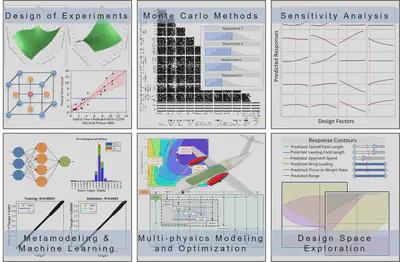Research
The IDEAS Lab at the University of Michigan develops advanced computational methodologies for system-level design and optimization of aerospace systems, with a focus on future aircraft and propulsion concepts. Our research integrates physics-based modeling, data-driven methods, and systems engineering principles to enable next-generation aerospace technologies that maximize efficiency, performance, operational capability, and cost-effectiveness.

Research Focus Areas:
- Computational Systems Design & Optimization: Developing physics-based, reduced-order, and machine learning-driven models to support multidisciplinary design, analysis, and optimization (MDAO) of next-generation aircraft and propulsion systems. Our approach combines first-principles simulations with surrogate models for efficient design space exploration and surrogate-based optimization, enabling rapid assessment of novel aerospace configurations while accounting for variability in design parameters and operational conditions.
- Advanced Propulsion Architectures & Energy Systems: Investigating electrified, hydrogen, and hybrid-electric propulsion, including high-efficiency turbomachinery, through multi-fidelity modeling and integrated power and energy management. We develop methods to quantify cost, efficiency, and performance trade-offs, enabling the evaluation and optimization of mission-viable propulsion solutions.
- Technology Evaluation & System-Level Trade Studies: Conducting quantitative assessments of emerging aerospace technologies, evaluating their impact on vehicle performance, operational feasibility, energy demand, and mission effectiveness at both the system and system-of-systems levels.
- Model-Based Systems Engineering (MBSE): Developing integrated modeling frameworks to enhance system architecture design, requirements management, and lifecycle analysis, ensuring scalability and interoperability in complex aerospace systems.